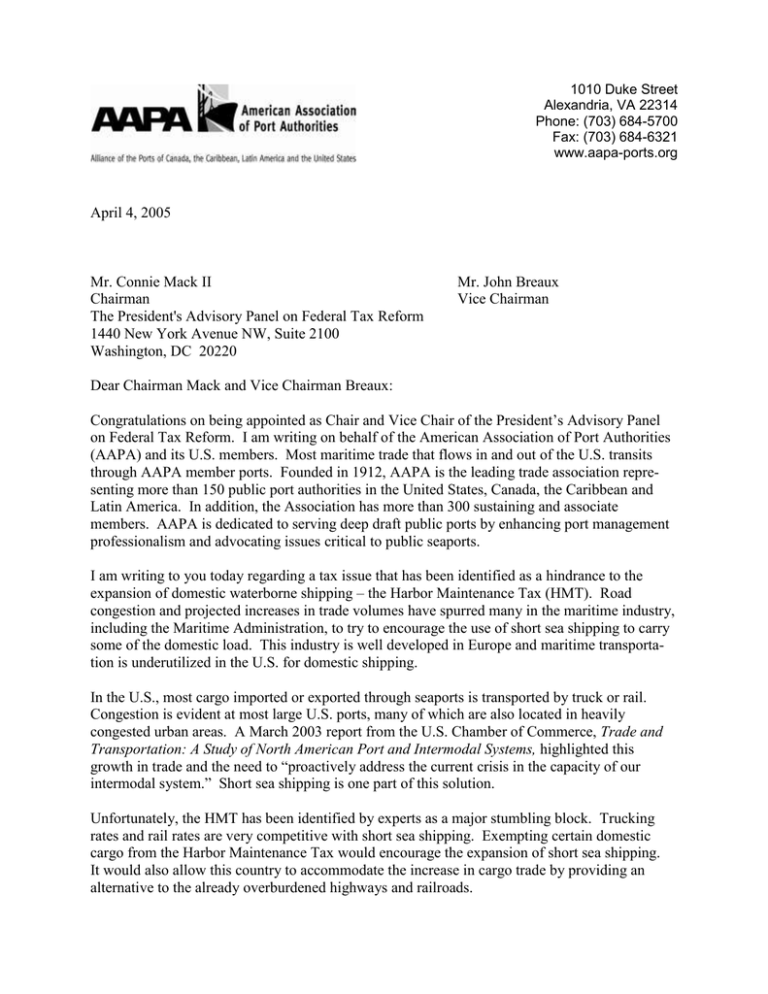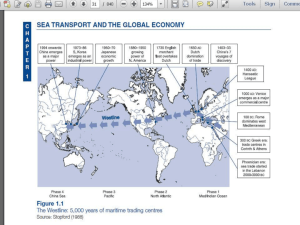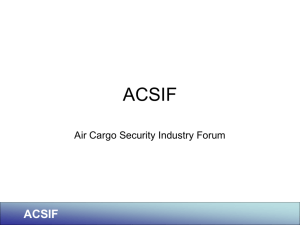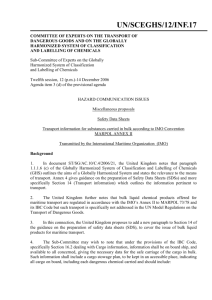April 4, 2005 Mr. Connie Mack II Mr. John Breaux
advertisement

1010 Duke Street Alexandria, VA 22314 Phone: (703) 684-5700 Fax: (703) 684-6321 www.aapa-ports.org April 4, 2005 Mr. Connie Mack II Chairman The President's Advisory Panel on Federal Tax Reform 1440 New York Avenue NW, Suite 2100 Washington, DC 20220 Mr. John Breaux Vice Chairman Dear Chairman Mack and Vice Chairman Breaux: Congratulations on being appointed as Chair and Vice Chair of the President’s Advisory Panel on Federal Tax Reform. I am writing on behalf of the American Association of Port Authorities (AAPA) and its U.S. members. Most maritime trade that flows in and out of the U.S. transits through AAPA member ports. Founded in 1912, AAPA is the leading trade association representing more than 150 public port authorities in the United States, Canada, the Caribbean and Latin America. In addition, the Association has more than 300 sustaining and associate members. AAPA is dedicated to serving deep draft public ports by enhancing port management professionalism and advocating issues critical to public seaports. I am writing to you today regarding a tax issue that has been identified as a hindrance to the expansion of domestic waterborne shipping – the Harbor Maintenance Tax (HMT). Road congestion and projected increases in trade volumes have spurred many in the maritime industry, including the Maritime Administration, to try to encourage the use of short sea shipping to carry some of the domestic load. This industry is well developed in Europe and maritime transportation is underutilized in the U.S. for domestic shipping. In the U.S., most cargo imported or exported through seaports is transported by truck or rail. Congestion is evident at most large U.S. ports, many of which are also located in heavily congested urban areas. A March 2003 report from the U.S. Chamber of Commerce, Trade and Transportation: A Study of North American Port and Intermodal Systems, highlighted this growth in trade and the need to “proactively address the current crisis in the capacity of our intermodal system.” Short sea shipping is one part of this solution. Unfortunately, the HMT has been identified by experts as a major stumbling block. Trucking rates and rail rates are very competitive with short sea shipping. Exempting certain domestic cargo from the Harbor Maintenance Tax would encourage the expansion of short sea shipping. It would also allow this country to accommodate the increase in cargo trade by providing an alternative to the already overburdened highways and railroads. Mr. Connie Mack and Mr. John Breaux April 4, 2005 Page 2 As former Senators from states that are heavily reliant on the maritime industry, you are most likely familiar with the HMT. Established in 1986, the Harbor Maintenance Tax is an ad valorem tax on the value of commercial cargo. The tax is deposited into a trust fund to pay 100% of maintenance dredging of harbors, which is conducted by the U.S. Army Corps of Engineers. Unfortunately, Congress has not allowed full use of this trust fund, and there is currently a surplus of $2.6 billion. Allowing full use of the trust fund is also an issue we hope your advisory group will address. There are currently several exemptions from the HMT, and we hope your advisory board will endorse an exemption for certain intermodal cargo shipped on coastal routes or rivers between U.S. ports. The current law excludes ferries, cargo moving to and from Alaska and Hawaii other than Alaskan crude oil, and any cargo associated with vessel movements to and from and on the fuel taxed inland waterways system. We are not encouraging a full domestic exemption, only a tax law change that would impact containerized, ro/ro, and certain breakbulk cargo, but not bulk cargos, since much of this type of cargo already heavily use the maritime system. As with any tax change, it is important to consider the cost. The Corps of Engineers reports that for FY’02 (the last report on the Harbor Maintenance Trust Fund) the total of all HMT domestic payments was $28 million. Since we are proposing that only a subset of the domestic cargo be exempt, the cost would be less. Domestic cargo was only 4.3% of the total HMT collected in 2002. With a $2.6 billion surplus in the trust fund that continues to grow each year, adding this exemption to the law would not harm the trust fund. Short sea shipping is an exciting opportunity that shows great promise for helping the U.S. address the congestion and future growth of trade in this country. By recommending a change in the tax law to provide an additional exemption for certain domestic cargos, your advisory committee would be doing a great service to helping this nation by promoting the transportation solutions for tomorrow. We also hope you will investigate the inequity of the underspending of the Harbor Maintenance Trust fund and consider a solution to develop a closer relationship between contributions to this fund and the appropriations level approved each year for the Corps of Engineers operations and maintenance (O&M) account. Each year there are many unmet O&M needs in the President’s budget, despite the fact the trust fund has a large and growing surplus. The American Association of Port Authorities thanks you for your consideration of these important maritime issues and would be very interested in discussing this matter further with the entire Advisory Panel. Sincerely, Kurt J. Nagle President


